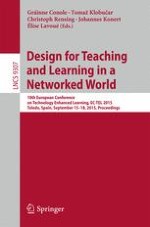2015 | OriginalPaper | Chapter
A Learning Analytics Approach to Correlate the Academic Achievements of Students with Interaction Data from an Educational Simulator
Authors : Mehrnoosh Vahdat, Luca Oneto, Davide Anguita, Mathias Funk, Matthias Rauterberg
Published in: Design for Teaching and Learning in a Networked World
Publisher: Springer International Publishing
Activate our intelligent search to find suitable subject content or patents.
Select sections of text to find matching patents with Artificial Intelligence. powered by
Select sections of text to find additional relevant content using AI-assisted search. powered by
